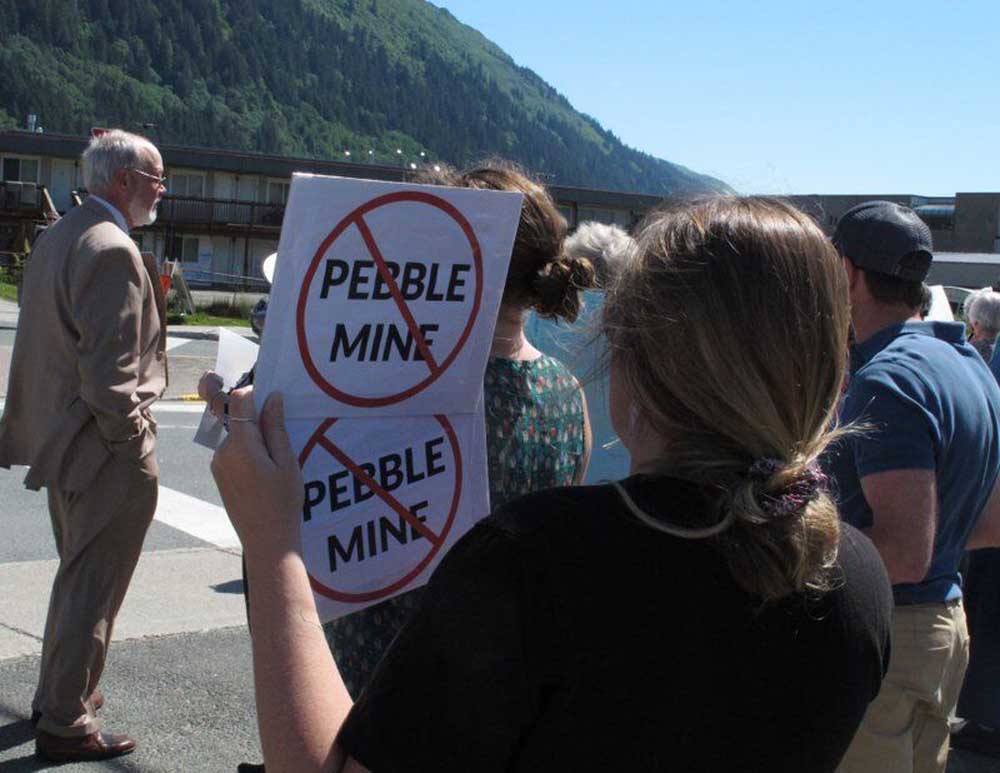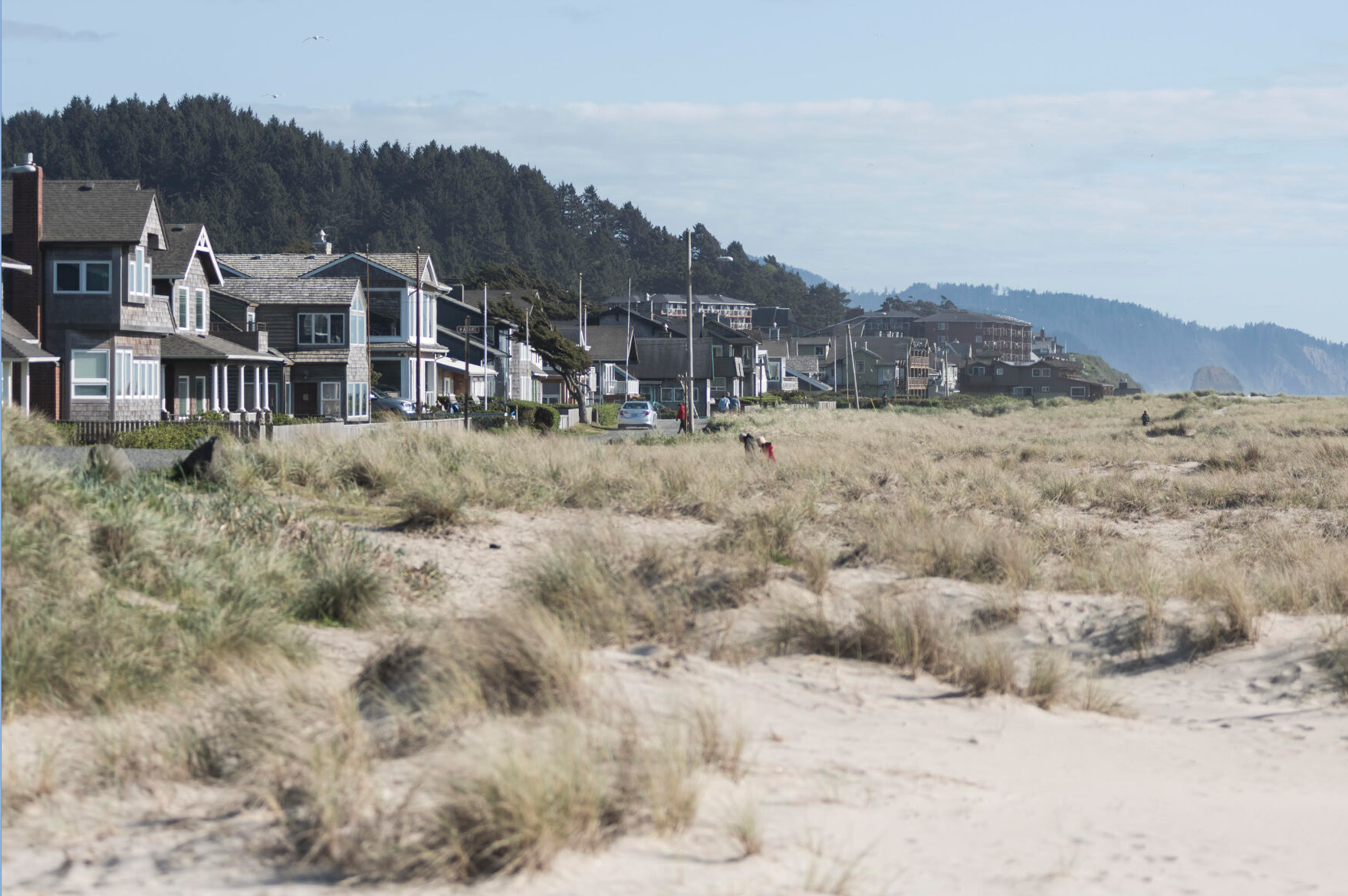Trump administration denies permit for Pebble mine
Published 2:20 pm Wednesday, November 25, 2020

- Protesters against the Pebble mine project gathered outside U.S. Sen. Lisa Murkowski’s office in Juneau last year.
The Trump administration on Wednesday rejected a permit for the controversial Pebble copper and gold mine in southwest Alaska.
Trending
The decision brings to an end — for now at least — the long-sought, roller-coaster effort to build the giant project near the world’s largest wild sockeye salmon fishery.
The U.S. Army Corps of Engineers “determined that the applicant’s plan for the discharge of fill material does not comply with Clean Water Act guidelines and concluded that the proposed project is contrary to the public interest,” said Col. Damon Delarosa, the Army Corps’ Alaska district commander.
Delarosa said the agency’s denial caps a nearly three-year review process of the potential project involving multiple agencies, and was based on all “available facts and complies with existing laws and regulations.”
Trending
The news was swiftly praised by Pebble opponents, as well as Alaska’s Republican U.S. senators, who both came out strongly against the project in recent months.
“After years of review and analysis, the Army Corps has found that this project is ‘contrary to the public interest,’ ending consideration of its permit application and affirming that this is the wrong mine in the wrong place,” said U.S. Sen. Lisa Murkowski.
“Given the special nature of the Bristol Bay watershed and the fisheries and subsistence resources downstream, Pebble had to meet a high bar so that we do not trade one resource for another,” said U.S. Sen. Dan Sullivan. “As I have been saying since August, Pebble did not meet that bar.”
Longtime critics of Pebble called the decision a win for tourism, sportfishing and commercial fishing jobs. They said Pebble’s proposal was half-baked and would have devastated the fishery.
“Good riddance,” said Nelli Williams, Alaska director of Trout Unlimited. “The opposition to this project from all corners of the political spectrum runs strong and deep. The science is clear, the process has played out and there is no way this ill-conceived project can coexist with Bristol Bay salmon.”
John Shively, Pebble Partnership chief executive, called the decision a “lost opportunity” for Alaska and the people from the region. The mine could have produced billions of dollars over its life, hundreds of Alaska jobs and minerals with critical national importance for renewable energy such as copper, the company has said.
Appeal likely
The company plans to administratively appeal the Army Corps decision, Shively said. Pebble has 60 days to file that appeal.
“We are obviously dismayed by today’s news given that the USACE had published an Environmental Impact Statement in July that clearly stated the project could successfully coexist with the fishery and would have provided substantial economic benefit to the communities closest to the deposit,” he said. “One of the real tragedies of this decision is the loss of economic opportunities for people living in the area.”
Pebble parent Northern Dynasty Minerals called the decision “politically motivated” and “fundamentally unsupported by the administrative record as developed” by the Army Corps during the review process.
The finding that the mine is “not in the public interest” is wrong, Northern Dynasty said. “The (Corps’ final environmental report) found Pebble to be a project of merit that would fully coexist with clean water, healthy fish and wildlife populations, and the important fisheries resources of southwest Alaska,” the parent company said.
Alaska Republican U.S. Rep. Don Young said he is disappointed that the fate of a project on state land appears to have been decided by the federal government.
“Now there must be a consideration of how the federal government will compensate the state for the loss of economic potential,” he said. “The proposed mine has always been subject to political intrigue and the whims of outsiders who simply do not understand our state.”
The mine is proposed for construction about 200 miles southwest of Anchorage, near headwaters of the Bristol Bay salmon fishery.
The project seemed all but dead under former President Barack Obama, when the Environmental Protection Agency in 2014 prepared to veto the project. Major mining companies over the years have also pulled out of the project, leaving Northern Dynasty Minerals, a small Canadian company, alone with a mine that would cost billions of dollars to develop.
But President Donald Trump reversed the Obama administration’s effort four years later, and the project moved steadily forward under Trump until hitting new headwinds late this summer. Prominent Republicans, including Murkowski and Sullivan, and even Donald Trump Jr., the president’s son, said they opposed the mine.
‘Pebble Tapes’
In September, a conservation group released the so-called “Pebble Tapes,” after secretly employing people to act as potential investors in the mine. Pebble executives were caught on tape discussing what they described as close ties with Murkowski, Sullivan, Alaska Gov. Mike Dunleavy and the Army Corps.
The senators, the governor and the Army Corps have denied the statements as false. But they led to unfavorable headlines in the press, renewed opposition to the project by critics, and efforts by a U.S. House committee to uncover records about the project.
In late August, the Army Corps said a Pebble mine with a 20-year life would cause “significant degradation” in the Bristol Bay watershed. The Army Corps’ parent agency, the U.S. Army, said the project could not be permitted as proposed under the Clean Water Act.
But the Corps left open a single, difficult path for Pebble: submitting a mitigation plan that offset damage the mine would cause to wetlands in the Bristol Bay region. Experts said it was a steep hurdle because it likely meant Pebble would need to somehow create a plan setting aside large amounts of state land for protection in a pristine area that mine critics said had no other major development threats beyond Pebble.
The mitigation plan was determined to be out of compliance with requirements, the Army Corps record of decision said.
It lacked adequate information in multiple areas, including financial assurances and details needed to determine if it was sufficient to offset the mine’s impacts.
An administrative appeal could be made to the Army Corps for consideration, the agency said in its denial letter to Pebble.









